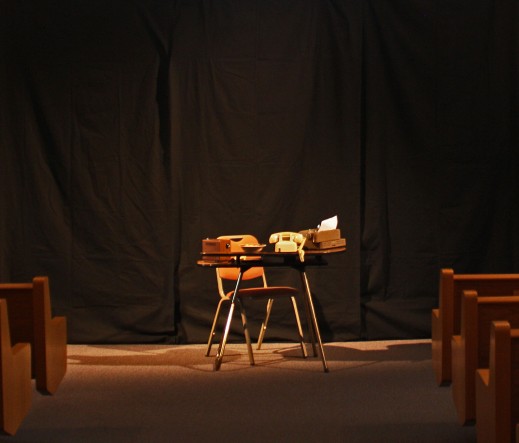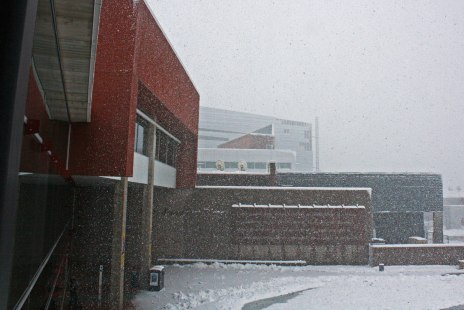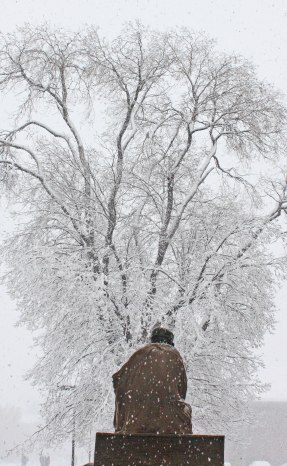
“As for me, I am a watercolor./I wash off.” -Anne Sexton, “For My Lover, Returning to his Wife“
It should be monsoon season in Flagstaff but the air is bone-dry and the only thing in the sky that isn’t hazy blue is a plume of wildfire smoke. I sit in a tea house while “Back in the USSR” plays on the radio, sipping oolong and watching passerby walk up Aspen Avenue in downtown Flagstaff. It’s just like the old days, or just like how I remember the old days, but something is different. I’m just like the passerby now. I can no longer be a smug local people-watching the tourists.
My childhood in northern Arizona was defined by two local features: The inevitability of wildfires and the possibility of leaving for outer space. In 1884, a fire destroyed Old Town, leaving only the part of the city closest to the tracks. Ten years later, Percival Lowell founded an observatory on a hill above the city to look for life on Mars, though his research would later lead to the discovery of Pluto. Flagstaff is a city of dreamers, artists, mystics, and scientists. I landed squarely in one of these quadrants, or all of them.
I left Flagstaff four years ago. It’s not as if this city is completely different. Instead, Flagstaff to me has entered the uncanny valley. It’s familiar enough that I recognize it for what it’s supposed to be, but enough of it has changed that it just doesn’t feel right. I am also a different person. We meet one another, the city and I, halfway at our respective crossroads, doing double takes.
Still, I have connections. In a tiny house in a semi-familiar neighborhood, I help fold veggies into egg roll dough with four Flagstaff friends, two married couples, both of whose weddings I missed because I was traveling or had already skipped town. We sit outside under strings of lights in the now seasonably warm evening air and catch up.
I used to live with one friend here in a house on Talkington Street near the ski resort. I’m glad how familiar this scene still is, how easy it is to cook with friends after so long apart. Later, we chat about people we remember from high school, wherever they’ve ended up. Sammie shows me an art project. Cari is going to seminary in New England in a few weeks. Ryan is preparing another album after a month-long tour.
This is the Flagstaff I have always known, catering to the ambitious and the adamant. Following the emergence of art, mysticism, and dreams, though, there is always some form of commercialization, and Flagstaff is not immune from the power of Capital to market nostalgia.
It’s fitting that the first settler structure here was a saloon, before the loggers and miners moved in. Gun violence was commonplace. In one apocryphal account, there was a saloon murder every week between 1882 and ’83. Were it not for the scientists who took an interest in the region, John Wesley Powell and Percival Lowell, Flagstaff would have likely become one more ghost town or company town, its residents finally driven out when logging and mining came to a standstill. Instead, Flagstaff became a tourist town and a college town. And, at a certain point, the college experience is sold to high school graduates using the same advertising techniques that tourist traps use. Come for the mountain view, stay for the nostalgia.
Except, most people who can afford to stay in Flagstaff are long-time residents. And expensive student housing structures have popped up across from the tracks, and parking is now regulated with warnings and tickets, and there’s a fire close to my old neighborhood. The last few days I’m here, my phone is constantly buzzing with evacuation alerts and flash flood warnings from late rainstorms. I am used to waiting for evacuation notices. This is something they don’t advertise in the college brochures, to be ready to go at a moment’s notice, to have a bag packed at the door. And I heed the warning. I am ready to leave.
-jk













 It finally happened. I graduated. I shook hands with the Dean of Arts and Letters and some of my favorite literature professors, and was handed a fancy diploma case for after the real one arrives in the mail. I went through the whole ritual, but when I left the Skydome amidst Flagstaff’s annual early-May snowstorm, I felt about as empty as the diploma case they gave me.
It finally happened. I graduated. I shook hands with the Dean of Arts and Letters and some of my favorite literature professors, and was handed a fancy diploma case for after the real one arrives in the mail. I went through the whole ritual, but when I left the Skydome amidst Flagstaff’s annual early-May snowstorm, I felt about as empty as the diploma case they gave me.



